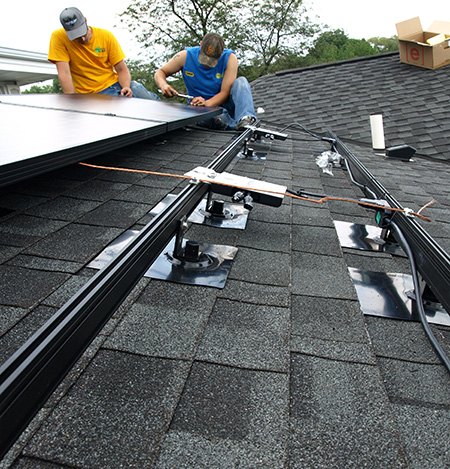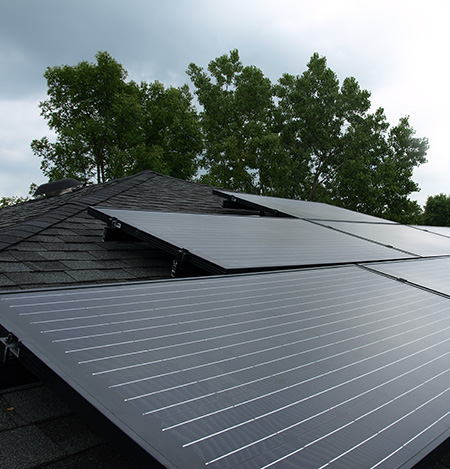Why Roofing Matters When Choosing Solar Panels
 More than one million homeowners throughout the U.S. have invested in photovoltaic solar panels to increase energy efficiency and reduce energy costs for their homes. In fact, there were over 14,000 MW of solar panels installed in 2016 providing ample energy to power 8.3 million homes, according to the Solar Energy Industries Association. And with the cost of solar at historic lows, the number of solar panel installations are expected to triple by 2022. But whether or not solar panels will pay off for your home depends on a variety of factors including your roof type, age, pitch and exposure.
More than one million homeowners throughout the U.S. have invested in photovoltaic solar panels to increase energy efficiency and reduce energy costs for their homes. In fact, there were over 14,000 MW of solar panels installed in 2016 providing ample energy to power 8.3 million homes, according to the Solar Energy Industries Association. And with the cost of solar at historic lows, the number of solar panel installations are expected to triple by 2022. But whether or not solar panels will pay off for your home depends on a variety of factors including your roof type, age, pitch and exposure.
First, let’s consider your home’s exposure. Although you look out the window and see a bright sunny day, your roof may not be directly exposed to the sun. The facing of your roof in relation to the sun makes a big difference in its ability to capture solar energy. Depending on the season, most homes will have an adequate exposure. On the other hand, some homes with an eastern or northern exposure may not always have a direct view of the sun’s powerful rays.
Second, the condition and age of your roof is an important consideration. While solar panels can be installed on an existing roof, it should be in good condition. Repair or replace any cracked or missing shingles or tiles and make other necessary roofing repairs. And if you have an older roof with less than ten years of life expectancy remaining, you may want to consider replacing your roof then add solar panels with your new roof.
Third, your roof line needs to be clear of obstructions like trees, pipes and other obstructions that can cast a shade over the solar panels. Just like a satellite dish often loses its signal when heavy clouds are in its line of sight, the same concept applies to solar panels. Since each panel produces approximately 1 kWh of power per day, even if one or two panels are covered in shade can reduce energy savings.
 Finally, solar panels can be installed on most types of roofs including both flat and sloped roofs. However, pitch is an important factor in determining the efficiency of solar panels. The pitch of the solar panels depends on the latitude coordinate of where you live. Since the latitude for most of the U.S. is between 25 degrees south and 45 degrees north, the position of your solar panels will be angled accordingly so that is in the line of sight of the sun. Your solar panel installation professional will take the appropriate measurements to ensure maximum energy performance.
Finally, solar panels can be installed on most types of roofs including both flat and sloped roofs. However, pitch is an important factor in determining the efficiency of solar panels. The pitch of the solar panels depends on the latitude coordinate of where you live. Since the latitude for most of the U.S. is between 25 degrees south and 45 degrees north, the position of your solar panels will be angled accordingly so that is in the line of sight of the sun. Your solar panel installation professional will take the appropriate measurements to ensure maximum energy performance.
